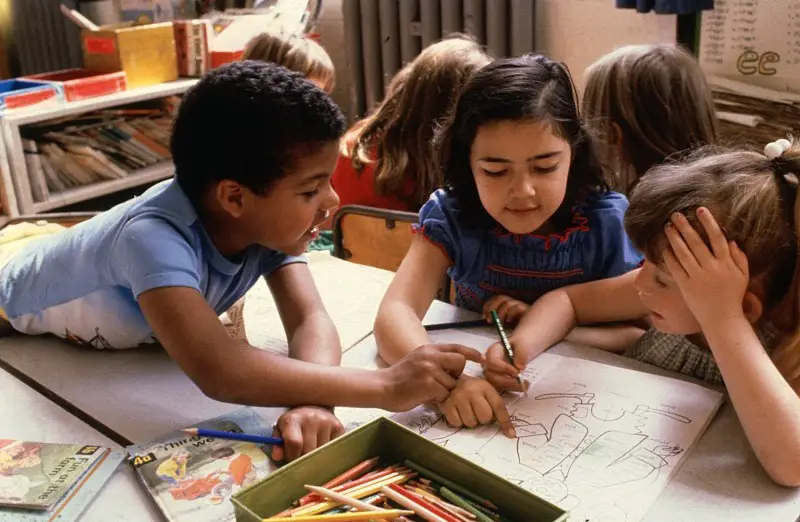19th February 2016
Contributing Writer for Wake Up World
“The world got compulsion schooling at the end of a state bayonet for the first time in human history; modern forced schooling started in Prussia in 1819 with a clear vision of what centralized schools could deliver: Obedient soldiers to the army; Obedient workers to the mines; Well subordinated civil servants to government; Well subordinated clerks to industry; And citizens who thought alike about major issues.” ~ John Taylor Gatto
Schools have never been about the needs of children. Since their inception they have been about creating a populace that caters to the desires of the ruling class. Corporate leaders and their allies in government have continually worked to shape education to fit the requirements of industry. They are not interested in developing independent, self-directed individuals with the capacity to think critically and originally; they benefit from creating a malleable, suggestible, obedient and competitive population that accepts being instructed, monitored, assessed and controlled from the top down.
One would expect that as we advanced as a society our schools would become more progressive and increasingly able to meet the diverse intellectual and creative needs of the populace. Instead the opposite has happened. Schools have become ever more focused on standardisation and uniformity which means that creativity is stifled and those who don’t learn in the same way as the majority often fall through the cracks.
“What is the purpose of industrial education? To fill the young of the species with knowledge and awaken their intelligence? Nothing could be further from the truth. The aim is simply to reduce as many individuals as possible to the same safe level, to breed and train a standardized citizenry, to put down dissent and originality. That is its aim in the United States and that is its aim everywhere else.” ~ H. L. Mencken
Once Upon a Time…
Humans are naturally curious, creative beings, with individual styles and perspectives that cannot and should not be ranked. As children we adore learning and are often thrilled about the idea of starting school. Unfortunately, it usually doesn’t take long for this love of learning to be squelched. Boring, repetitive coursework with little or no outlets for meaningful exploration or creative input, and hours of restricted movement and behaviour, quickly sees the instinctive desire to learn shrivel up. Marks and general assessment mean that children are taught that it is natural and right to measure and compare themselves with others. Those that fall into line and follow instructions are rewarded for their compliance, while those that don’t fit the mould, or rebel against conformity are taught to see themselves as inferior.
Once upon a time, when there was less state control, a child could be lucky and find themselves with a great teacher; a person who through their own distinct insight and connection embraced and nurtured the student’s uniqueness. However, teachers today also suffer from the pressures of the top down approach that requires them to comply with strict standards in terms of the curriculum and student outcomes and assessments. In most systems they no longer have enough autonomy, flexibility, or time required to encourage self-directed learning or to use their own judgement in terms of their student’s individual requirements.
Study Shows Group Learning (Not Teacher-Led Discussion) Makes Children Better Decision-Makers
A recent study published in the American Educational Research Journal, supports the idea that children learn better when the hierarchical, top down structure is eliminated. It found that children who participate in collaborative group work become better decision-makers than their peers who learn the same curriculum through teacher-led discussions.
“Collaborative group work positions students as active decision-makers, whereas direct instruction places them in a passive role, following the reasoning of their teacher,” Zhang, the lead researcher, said. “We further theorize that the essential difference between collaborative group work and direct instruction is that students learn about the ‘self as agent and others as (the) audience.”
According to the researchers, the children who learned collaboratively showed more proficiency in 3 important aspects of decision-making: recognizing more than one side of a dilemma, considering the variety of reasons for and against differing viewpoints, and weighing up the costs and benefits associated with their decisions.
“If children are to become thoughtful decision-makers, they need more time in the school day for collaborative group work that involves active reasoning about significant issues,” Zhang said. “Promoting active reasoning is one key to cultivating disadvantaged students’ development of intellectual competence and academic ability.”

We Don’t Need No Thought Control…
Unfortunately, no matter how many passionate academics demonstrate the flaws with our current educational system, the sad reality is that we rarely see these findings significantly reflected in the way schools operate. The education system doesn’t change because while it may be failing many of the students and disappointing parents, the schools are serving their real purpose which is to produce a useful and compliant workforce that fulfils industry requirements. In a society in which corporate profit outweighs the needs of individuals and community, schools are not evaluated for whether students become autonomous, empowered, citizens, but whether they produce economically productive workers.
“I imagine a school system that recognizes learning is natural, that a love of learning is normal, and that real learning is passionate learning. A school curriculum that values questions above answers…creativity above fact regurgitation…individuality above conformity.. and excellence above standardized performance….. And we must reject all notions of ‘reform’ that serve up more of the same: more testing, more ‘standards’, more uniformity, more conformity, more bureaucracy.” ~ Tom Peters, “Re-Imagine!”
I believe that every human has innate gifts to offer the collective, our own personal genius to draw on and share. At some level we all crave meaning and purpose. We are all equal, but have different areas of interest, different strengths and different approaches. We naturally want to contribute and have the value of our contributions be recognized. If we prioritised self-direction, ingenuity, innovation and collaboration over compliancy, standardisation and competition we would likely see the emergence of unfathomable brilliance that has the ability to bring humanity to a new level of existence.
“I’ve concluded that genius is as common as dirt. We suppress our genius only because we haven’t yet figured out how to manage a population of educated men and women. The solution, I think, is simple and glorious. Let them manage themselves.” ~ John Taylor Gatto
The soul crushing nature of the school system is seeing an increase in parents joining ‘the unschooling’ movement and choosing to remove their children from the repressive, restrictive classroom environment. Unschooling is an organic educational approach that honours a child’s creative instinct and provides them with the freedom to learn according to his/her own interests and desires. Of course due to individual circumstances this style of education is not possible or suitable for all families.
However, the more of us who stop looking towards voices of ‘authority’ for direction and take the time to question dominant ideas and encourage our children to do the same, the more this will become the norm. When more of us reconnect with our inner creative sparks and become increasingly comfortable with allowing our individuality to shine, the less willing we will be to contort and repress our innate expression in order to fit a stale old paradigm mould. No one person will be able to change the system, but we all have the ability to make personal transformations within our sphere of influence—starting with ourselves.
Source:
About the author:
Christina Lavers is a writer, an artist, a creative enthusiast, and an inner world explorer. Born in Montreal Quebec Canada, she now lives with her life partner and son in a rainforest pocket in the hills behind Coffs Harbour, NSW Australia. She spends her time playing, creating, growing and sharing.
Christina is devoted to assisting people to find and connect with their own creative magical current that flows deep within. She is now offering a comprehensive e-course designed to help people light up their world with passion and creativity. You can access Section One here for free!
Christina has also recently published her first full length book, a memoir about her wild awakening journey entitled Jump Into the Blue, and she is currently working on the next one.
“My journey has been about personal alchemy… exploring the mysteries of my soul and my environment, and learning to bring all aspects, the light and the dark, together with the transcending ingredient… love. The more I uncover and nurture the wounded aspects of my being, the more whole and grounded I feel and the more my outer world reflects the love, wonder and magic I have discovered inside”.
You can follow Christina’s work at:
Further reading from Christina Lavers:
- New Study Shows Regular Contact with Nature Reduces Crime, Increases Social Cohesion
- Research Shows Just 7 Minutes of Meditation Can Reduce Racial Prejudice
- Taking Care of Our Inner Tribes – Microflora, Awakening and You
- Groundbreaking Study Maps the Decline of Wild Bee Communities in the United States
- Discernment – Navigating The Spiritual Minefield
- Synchrony and Exertion of Dancing Found to Encourage Social Bonding, Raise Pain Threshold
- Quitting Smoking? Try These Herbs, Tips and Incentives to Help You Succeed!
Source Article from http://wakeup-world.com/2016/02/19/group-learning-not-teacher-led-discussion-makes-children-better-decision-makers/
Related posts:
Views: 0
 RSS Feed
RSS Feed

















 February 19th, 2016
February 19th, 2016  Awake Goy
Awake Goy 

 Posted in
Posted in  Tags:
Tags: 
















